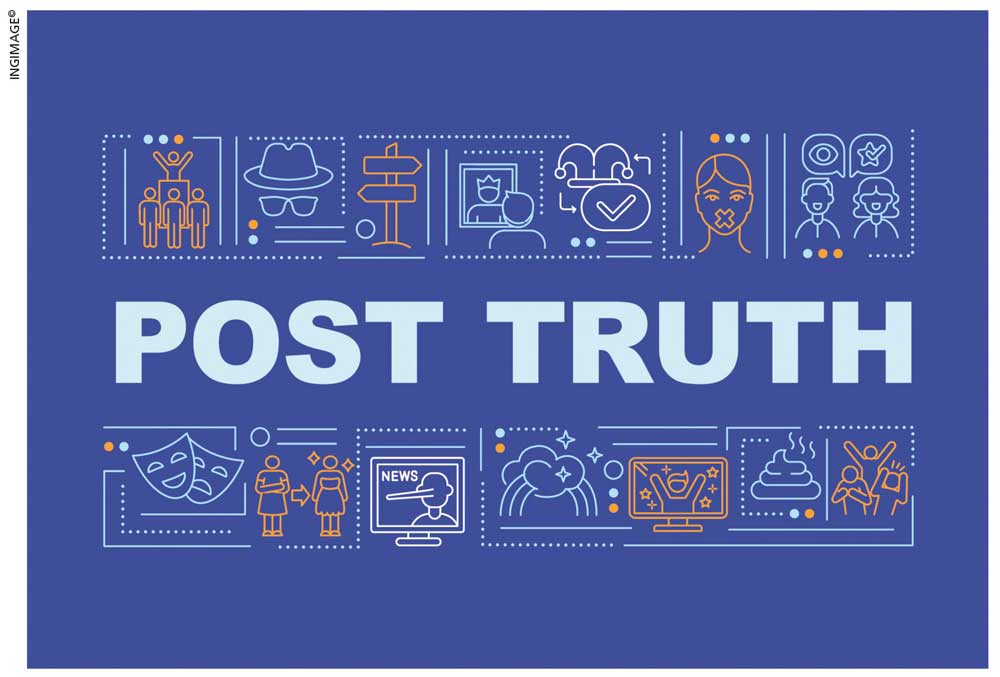POST-TRUTH WORLD
TRUST IS THE KEY TO BIZ
Manilka Ediriweera says truth and transparency are vital for businesses

We live in a world where advanced technology and digital machines shape our institutions. As such, there is a tendency for the truth to be tampered with and manipulated, resulting in the trust factor deteriorating. This is an issue because the effects of the post-truth world are felt everywhere – including in politics and business.
While the roots of post-truth have been around for decades, it gained popularity in 2016 when the Oxford English Dictionary acknowledged it as its ‘Word of the Year.’
So what is post-truth and are we living in such a world?
Truth be told, it is a politically loaded concept. It can be considered a mechanism used by authoritarians and political figures to control the flow of information – and eventually, people. Despite it being a politically loaded concept however, the effects of such a world are felt everywhere.
Public opinion is shaped more by emotions and personal beliefs than objective facts in the post-truth world. It can also be taken as peoples’ inclination to shape reality to fit in with their opinions rather than the other way around.
This warping of reality reveals how facts can be shaded, selected and presented in a manner that supports one version of truth over another. Either way, there is an increasing risk of losing sight of truth.
At the Euro 2020 press conference for example, Cristiano Ronaldo removed the Coca-Cola bottles in front of him and replaced them with a bottle of water. Apparently, this incident resulted in a drop in Coca-Cola’s market value by around US$ 4 billion with its share value dropping by 1.6 percent.
However, it seems that Coca-Cola’s market value had already been down due to several other factors prior to the press conference. Because of this incident nevertheless, Coca-Cola’s share price increased by only US$ 0.30 at the end of the trading day.
This is an excellent example of how information flows in the post-truth world. From political misinformation to fake news, rumours and lies on social media, it is apparent that we are living in such a world.
While the concept of post-truth may have existed in the past, the difference between now and then is that political bias coupled with the increased use of social media has led to a more rapid dissemination of disinformation and misinformation.
This is a challenge that’s unique to our times. Let’s identify the post-truth world’s implications for business and what organisations can do to overcome this challenge.
Trust is an essential factor for the success of any business because it’s the foundation of all relationships. For businesses or brands to succeed and be sustainable in the market, enjoying long-lasting relationships built on trust with their customers is vital. But businesses are strongly challenged by the post-truth era because they’re defined by misinformation and disinformation.
Therefore, trust is vital for businesses to succeed – because if consumers perceive a brand to be untrustworthy, they will reject that entity and choose another they deem credible. This is why brands should always be authentic and transparent.
Enterprises can take steps to approach customer privacy and data storage responsibly; be socially conscious; advertise honestly; create an authentic organisational culture to prevent the formation of knowledge and information gaps; and define, measure and reinforce standards for truth.
Most importantly, it’s crucial to champion transparency, integrity and progress over perfection because they are the tools for success in today’s post-truth world that’s armed with mistruths. As scientist and entrepreneur Dr. Santosh Kalwar once said, “trust starts with truth and ends with truth.”
Businesses should be honest and transparent in all situations – especially those that test them – because the way they react can shape the future of the business.
One way of building trust among consumers is through third party validation. In today’s world, the perception of a brand by most consumers is determined by reviews they find online. A review of an experience with a brand by even a nameless person that’s read by influential people who have millions of followers can influence different consumer segments.
So it’s no surprise that influencer marketing is on the rise. At the same time however, sources of third party validation are becoming less trusted.
Therefore, businesses shouldn’t simply ‘talk the talk’ but must also ‘walk the talk’ – and align their values with those of their stakeholders, to create a transparent and authentic business culture based on trust and truth. If enterprises can maintain their reputation capital, they will undoubtedly be able to succeed.
As writer George Orwell noted, “in times of universal deceit, telling the truth will be a revolutionary act.”




